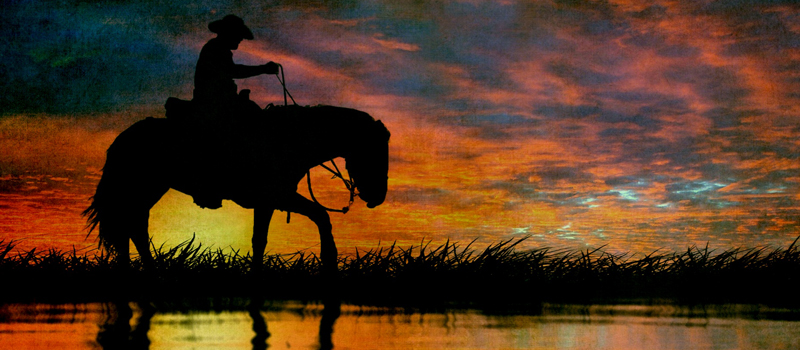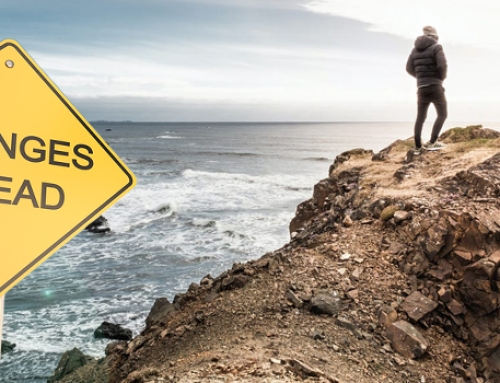Most people cannot even fathom that there is even a slight chance of things in America slipping back to the days of the Cowboys and Indians. That, once again we would need t work til our hands callouse to put food on the table and a roof over our heads. That from the time we wake up each morning, until we place our heads down exhausted that violence can happen to us.
People really shouldn’t avert their eyes from the today’s survival thinking for just a bit of a push or a shove to our electrical grid, or some sinister code that shuts down the internet and we look like, in just a few weeks alone, the pioneers who wandered the west 150 or so years ago.
Here’s how they got things done:
Every cowboy knows how important multi-use tools are. In the days of the cowboys, if you couldn’t fit it in a saddle bag, or in your bed roll, there was no room to carry it. They needed to have several ways to using one tool they had with them. Take for instance rope. Sure they can lasso a cow, but it serves so many other uses that it would be impossible to list. Suffice to say that that’s one thing that one could never have enough of and used to tie down a load on a truck bed or trailer.
When we think of the Wild West we often think of the old films with John Wayne or Clint Eastwood. They’d sit out under the stars, eating beans from a can drinking the fire coffee and chewing tobacco. Now, just think of the real cowboys, that rode the range, the mountain men that traveled the mountains, the trappers that forged the rivers.
Better yet, think of those who were here before the settlers of the 17 and 18 hundreds. What did they carry with themselves, the tools of the trade to provide them the items they needed for survival? Knives, weapons, tools that could be carried and used for multiple different things.
Navigation and Orientation – This is a skill that has been lost to Google Maps, however, basic compass, map, landmark recognition; preparation for traveling outdoors; reading nature signs, stars, and sun to navigate through wilderness; knowing the best routes and time to travel are all invaluable in the Cowboy world.
Whether someone is going to get out of Dodge to somewhere safer, they need to know where their surroundings and where they plan to take a stand and stay, at least for the short term. Transportation, or the lack of it, is a very important issue to consider and how much of what they have can be moved to where they are planning to go. Carrying capacities, and fuel will be a huge consideration as the lack of it prohibits what someone can bring and how far someone can go. You should put down the phone and pick up a paper map… you should understand how to read any credible map. You will likely not have any GPS system to guide you and the good old fashioned paper map may be the only way to show you where you are going. Understanding topographic maps is also key here.
Building a home, a lean-to, dugout, or a fort, or even a fence. Maslov’s pyramid of needs hierarchy is something you need to consider. Usually cowboys slept out under the stars. and in good weather conditions, there isn’t anything else like. But when things, like acclimate weather, or protection from vermin, the elements or from people. You need to know how to secure a shelter. Knowing how to use hand tools and simple machines will go a long way if you have to rebuild.
Start a Fire – Whether it is using matches, which will eventually run out, or with other materials you need to learn how to keep the fire going 24/7. without the modern conveniences. Learn what creates a spark that can save your life in times of need.
Cooking over a fire – The cowboy could do a lot with a properly prepared stick. Can you, when push comes to shove, be able to cook the food that you procured? You may have other methods to cook your food available, like a solar oven or barbeque grill, but an open fire is the most primitive and one of the most common means of cooking in a grid down emergency. Practice makes permanent.
Tracking, Trapping and Moving Around Stealthily – identifying animal tracks; understanding process of tracking, and knowing the signs of unnatural disturbances in your surroundings are all something that you need to get acquainted with. The trapping of animals for clothing and food; using dead falls and snares; proper preparation of traps; understanding their use and safety. All valuable to the coming Cowboy days.
While the Cowboy mindset might seem to stem from weathering bad times, it is actually based in a basic enjoyment of nature. Nature is a gift, and the ability to live comfortably from its provisions is one of the most life-changing experiences a person can ever have. The art of survival seems to have been lost over the years, but before the technology boom in the last century, it was commonplace to know and understand survivalist principles.
One of the most basic skills when in the wild is a combination of two methods. These methods are called the “Fox Walk” and “Wide-Angle Vision.” These were the basic “bread and butter” of how tribal populations would hunt and stalk without leaving any trace. Learning lessons from these peoples, it has enlightened us on how to live from the land.
Learn how to maintain fire/light at night – One of the most useful ways of gaining heat was though the various waxes, oils or fuels that one could find or make. Learn how to make candles and wicks, that can stay alight throughout the night. Another skill you should consider learning, is the extracting of the fats and other oils from animals and plants that will burn and can be obtained throughout nature and the outdoors. You never know how long solar battery rechargers for flashlights and LED battery powered lanterns will last.
The Stockpiling of Wood – Keeping warm was a chore at anytime during the year and even more so in winter. About the only thing Cowboys had to burn besides buffalo chis, was wood. When one is staying in one place, there was a woodpile or a woodshed associated with just about every house. Originally set in a fireplace or pit, the pot belly stoves, and various other variations of wood-burning stoves came into play. Use this heating source judiciously, because it can be a limited resource in your region.
Blacksmithing and Metalworking – I put this in there because it will be a useful skill to have in those days when you cannot go out and buy yourself some sheet metal. Repairs, and reconfiguring already made metal objects can be a marketable trade. Being able to make something useful like a horseshoe, tool, or cooking utensil from scrap metal could come in very handy as well. This is a skill people will barter for. Blacksmith work does require a good deal of practice and some special equipment, but it’s a skill worth learning and the learning curve is cut a bit if you already know how to weld or do other metal work.
Tanning Leather – Talking about things to barter with, learning the process of skinning a deer, fleshing, stretching, drying, scraping, soaking, brain tanning, and then smoking the hide to waterproof. Deer hides, horse hides, coon hides – was used for just about everything, & rawhide was very useful. And will be in the near future as well.
Specifically learning about how to make what was called ‘Mexican iron.’ The stuff is stiff as a plank, but if you put it in boiling water for a while, it becomes pliable. You can then use it in place of nails to tie a corral’s stringers to the posts. As it dried it would shrink, holding the stringers as effectively as nails.
Tailoring of Clothing – Another useful bartering skill is making of clothing. Because most items were hand-made on the frontier, almost any source of cloth could have been used to make shirts or dresses. Looms, textiles and all of that connected did serve it’s purposes in the days of the Cowboys, and will once again.
Quality of Community – Only Adam was lone man on this world, and since the Lord, gave him Eve, we have never been truly alone. We were not meant to survive in isolation forever. A healthy community did wonders for the Cowboys, and can do the same for us. There are a great many skills we can learn from one another. Nothing will help people survive more than a tight knit community that truly, and sincerely cares for its members.
In this community of the future, you will need to find people with different skills, access to different resources, and a psychological positivity that also have your same type of morals, and ethics. Finding others with the same mindset will help you survive long-term, and make the situation far more bearable than braving the dark times alone.
There isn’t any 911 – There wasn’t in the days of the Cowboys, and there won’t be any when times change. Guns were carried for deterrence and not for just settling an argument. Now, there is every type of gun known to man is available to protect family and property. When you properly respect the sanctity of life, and your ability to take it, you will know when is a proper time to use lethal force. Get understandings with those in your community about personal space, and safety and you then follow through with the word you gave them.
Learn first aid. – Again there is no 911, treating yourself and or others will probably be the only thing someone can do as medical professionals are going to be few and far between. Many places offer free classes on first aid because they want people in the community to be prepared. A good first aid book along with a first aid kit is something every household should have before, during, and after a disaster. Again I say, Practice Makes Permanent. Primitive conditions should be expected when anyone is helping someone after a catastrophe. A stockpile of antibiotics are always a good idea. Even acquiring the skill of making your own antibiotics can save lives as infection is something that will become an epidemic, especially with minor cuts and abrasives that are sure to be plenty.
Maintain Proper Personal Hygiene – This is not just a ‘don’t stink’ proposition, this is one of the top priorities because disease and sickness can, did and do take down the toughest of Cowboys. People must realize that after a major change, that is cataclysmic in nature, it is not like someone that goes camping, comes back dirty, and takes a nice long shower or a hot bath. Learn how to prevent diseases, and maintaining for yourself the optimal living to keep your immune system in good order.
Shooting your dinner. Or shooting to protect yourself. – Keeping on the subject of guns, ,learn to hit something with a bullet and you’ll be better fed and it may even keep you and your family alive.
Repairing guns and reusing ammo – Limited or no ammo availability for guns meant the brass has to last as long as possible in the days of the Wild West. Today, semi-auto rifles are harder on brass than bolt, falling block or other type’s rifles. With semi-autos, you have brass elongation; you need to trim your brass frequently, full-length size on every load. And after a few reloads, you basically run out of brass life
When it comes to gun repair, you need to know your way around them so that you can get the repair done properly. There is nothing worse than to have a gun jam, or worse explode, when you need it the most.
Herbal remedies. – On the brighter side of life preservation, when the doctor’s not around, knowing which herbs to use and how to use them to treat common ailments like cough, fever, headache, etc. can be a great blessing to your family or others around that may need the help. (herbal remedies)
Knowing and Preparing Wild Edibles. – Back in the day, Cowboys could sustain themselves even when food was scarce. They knew of certain plants, and trees that could sustain life if needed. You too need to know which plants in your area are safe to eat and what parts of them are edible A little foraging can add variety to your diet or even sustain life if there’s nothing else to eat.
Preserving food without a fridge – Many people have forgotten this old methods of preserving food, especially meat. There is the tried and true salting of the meat, or the drying of it. There is also the smoking of it over time. And though it may not be the most palatable, canned meats are good in a pinch. You need to get your protein, and whether you shoot it, fish for it, trap it, or barter for it, you will need to keep it longer than it will naturally.
Many older people remember having a smokehouse and a root cellar on their land when they were young. Learn how to create, and maintain both
Canning of Meat, Veggies and Fruit – If you are familiar with canning fruits and vegetables, you should know that you can also can meat. You have to make sure you get the temperature of the meat high enough to kill bacteria before it seals. Chicken and beef are good options for canning, as are fish. You can cook the meat before you can and seal it. For example, you could make beef stew and preserve it in cans. Stewed chicken also cans and preserves well. Raw packing is another option you can try as well.
Gardening – Growing your food, your very own vegetables and fruits, was the Cowboy way. Knowing soil conditions, how to get water to your plants, extending your harvest season, and common garden pests will be vital to having a continuous food supply. Check out The Forgotten Skills of Self-Sufficiency Used by the Mormon Pioneers for some great old-time gardening tips.
Saving seeds – The other end of gardening is being able to plant again next year. Saving seed can be kind of intimidating and mysterious, especially for plants like carrots that don’t go to seed in their first growing season. Start with non-hybrid seeds and a reference book like Seed to Seed and practice saving some kind of seed from your next garden. This is definitely a learned skill, but could be vital to a continued food supply.
Overall TakeAway
But of course while the Wild West depicted in films captivates audiences with its allure of adventure and heroism, the true essence of this era lies in its gritty realities. Beyond the silver screen lies a narrative of resilience, survival, and the unyielding spirit of pioneers who braved the untamed frontier in search of a better tomorrow. Understanding the authentic Cowboys of the Wild West allows us to appreciate the enduring legacy of those who shaped its tumultuous history.
The brave souls who ventured into the western frontier pursued opportunities for a new life. The journey was arduous, requiring fortitude and adaptability. Many traversed vast distances on foot, accompanied by pack animals laden with provisions. Others resorted to unconventional methods, such as transporting belongings in handcarts along rugged prairie and forest trails. Life in the Wild West was a constant struggle for survival. Settlers faced the daunting task of carving out a livelihood amidst untamed landscapes and hostile encounters. With rudimentary infrastructure and scarce supplies, every day was a testament to human endurance and ingenuity.
Their journey was fraught with peril, yet it epitomized the indomitable spirit of those who dared to tread the unknown. Your journey in the future will be most of the very same, you would serve yourself and those you love well, if you start gaining the skills of the Cowboys today.






